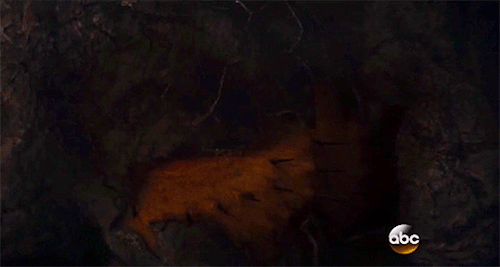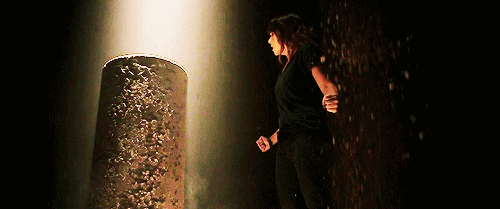
"NORTH AND SOUTH: BOOK II" (1986) - EPISODE FOUR "April-November 1864" Commentary
Episode Four of the 1986 miniseries, "NORTH AND SOUTH: BOOK 2" picked up at least seven to eight months after Episode Three left off. The miniseries arrived at a point in which the Civil War began to embark upon its last year. And yet, the miniseries itself had reached its mid point. I found it odd that producer David Wolper, director Kevin Reynolds and the production’s screenwriters would portray the war’s last year (in reality, eleven months) within three episodes. Oh well.
The episode began with a strong sequence that featured George Hazard's capture by John Mosby’s Rangers, while he and his men were transporting artillery guns and units to the front. The episode would return to George’s travails as a prisoner of war at Libby Prison in two more sequences. This first half hour also featured the beginning of Charles Main’s affair with Augusta, Billy Hazard’s return to the Sharpshooters’ regiment and the Battle of the Wilderness. Episode Fouralso portrayed the marriage woes of Ashton and James Huntoon, along with Elkhannah Bent’s attempt to woo Huntoon into his conspiracy against Confederate President Jefferson Davis; Madeline Main’s first meeting with former army officer Rafe Beaudine and her efforts to raise food and money for war refugees in Charleston; and Virgilia Hazard’s feud with her nursing supervisor, Mrs. Neal.
I have mixed feelings about Episode Four. I did not harbor a low opinion of it, as I did Episode Two and Episode Five. But I did not love it. I thought it began on a strong note with George’s capture and the Battle of the Wilderness. It also ended on a strong note with George’s experiences at Libby Prison and Virgilia’s troubles with Mrs. Neal. I must admit that I had a problem with the episode’s second act. Aside from the interesting scene that featured George’s arrival at Libby Prison and the revelation of the state of the Huntoon marriage, I had a bit of a struggle staying awake. One again, the 1986 miniseries managed to provide a battle sequence interesting enough to maintain my interest and impress me at the same time. Director Kevin Connor did an excellent job with this sequence by shooting it in a documentary style that gave it a stark and realistic look. And he was aptly supported by Jacques R. Marquette’s photography. For once, Marquette’s hazy photography served the narrative very well. The episode also benefited from Robert Fletcher’s lovely costumes, as shown in the images below:


I found General Ulysses Grant’s angry response to his staff’s fears over Robert E. Lee, following the Wilderness battle particularly enjoyable. What is interesting about this moment is that it actually happened. And I noticed that actor Anthony Zerbe not only used Grant’s actual words, but also improvised a few words into the speech. Actually, I felt it was the episode’s highlight, thanks to Zerbe’s performance. Another positive aspect of Episode Four turned out to be Ashton and James Huntoon’s marriage woes. Terri Garber and Jim Metzler did an excellent job of conveying how Ashton’s infidelity, Huntoon’s political failures and the war had put a toll on a marriage that had been loveless from the start. The venomous conflict between Virgilia Hazard and her supervisor, Mrs. Neal proved to be very interesting, thanks to Kirstie Alley and Olivia De Havilland’s excellent performances. I found both ladies unsympathetic, until Mrs. Neal decided to harass Virgilia, while the other was having trouble staying awake after long hours of work. I found the older woman's attitude simply bitchy. I also noticed that despite Mrs. Neal’s accusations of Virgilia’s poor ministrations to Confederate patients, the miniseries failed to substantiate her claims. And I found myself wondering if Mrs. Neal simply disliked Virgilia for the latter’s abolitionist leanings and marriage to a former slave.
Kirstie Alley had another chance to shine in a sequence that involved Virgilia's reconciliation with none other than Orry Main, who had been injured and captured by Union troops. No only did Alley give an excellent performance in this poignant sequence, but so did Patrick Swayze. I also have to give kudos to both James Read and Wayne Newton for the crackling hostility they managed to produce between George Hazard and his Libby Prison tormentor, Captain Thomas Turner. In fact, I never thought I would say this, but Newton made a damn fine villain. He nearly put Philip Casnoff, David Carradine and Terri Garber to shame. His performance certainly gave the Libby Prison sequence a creep factor that I found very effective. And if you look carefully, you might find actor Billy Drago (of "THE UNTOUCHABLES" fame) as one of the Union prisoners.
I do have several problems about this episode. One, I wish that Charles and Augusta's affair had begun a lot sooner than three years after they first met. In other words, I wish the screenwriters had followed Jakes’ original portrayal of their relationship. I believe this could have given Charles and Augusta’s affair more depth and paced a lot better. The portrayal of their affair developed into a major problem in Episode Six. Their affair began in the aftermath of one of the battles during the Wilderness Campaign. And for the likes of me, I could never understand what Charles was doing there, while wearing a heavy overcoat in the middle of May. The screenplay never explained why he was there.
Then we come to the problem of Billy’s return to his regiment after deserting for nearly ten months (he departed right after the Gettysburg battle in July 1863 and returned to his regiment either in late April 1864). The consequences he paid for deserting were ridiculous. Billy received a lecture from Colonel Hiram Burdan, passed over for a promotion to captain and threatened with court martial if he ever deserted again. What on earth were the writers thinking? Billy should have faced a court-martial or forced to resign his commission for being absent without leave for nearly ten months. Whoever had written this episode must have been completely ignorant of military protocol . . . or smoking something. And what was Berdan’s excuse for his leniency toward Billy? He needed all available men. Hogwash! This was the spring of 1864, when the Union Army's ranks were literally swollen for the remainder of the war, despite desertion. No other TV show, novel, play or etc., would have featured such a major writing gaffe. Then again, you never know. And why was Berdan still in command of the Sharpshooters in this episode? By keeping Berdan as Billy's commanding officer in this episode, the writers committed a historical gaffe. Berdan had decided to leave the Union Army by the late winter/early spring of 1864.
On the other hand, I found Madeline Main's efforts to help the poor – refugee slaves, free black and poor whites - in Charleston rather noble and dull as hell. Madeline’s first husband, Justin LaMotte, had contemptuously given her the nickname – "Madeline the Merciful" in the first miniseries. I hate to say this, but after viewing the beginning of this story line in Episode Four, I found myself sharing his contempt. Her actions were admirable, but I feel the writers went too far in portraying her in a noble light. Quite simply, one could easily accuse Madeline of harboring a savior complex – one that struck me as incredibly pretentious. This sequence also introduced a young former slave named Michael and his mother, who came from Tennessee. I really had a problem with this. Why on earth would Tennessee slave refugees head deep into Confederate territory, when they could have easily ended up in Union held cities like Nashville, Memphis and Vicksburg? However, this sequence featured a young Bumper Robinson as Michael, who managed to act circles around Lesley Anne Down (as if that were possible). And it also introduced the delicious Lee Horsley as a disgraced army officer-turned-wastrel named Rafe Beaudine, who came to Madeline’s aid against a band of scavengers. Horsley and Lesley Anne Down managed to create a sparkling screen chemistry that nearly put all of the other on-screen romantic pairings to shame.
In the end, Episode Four proved to be a mixed bag. It featured some excellent dramatic scenes and a well-shot battle sequence that helped me maintained my interest. On the other hand, it also featured some questionable writing that left me shaking my head with disappointment. It was not one of my favorite episodes, but was certainly not a disappointment either.

















































